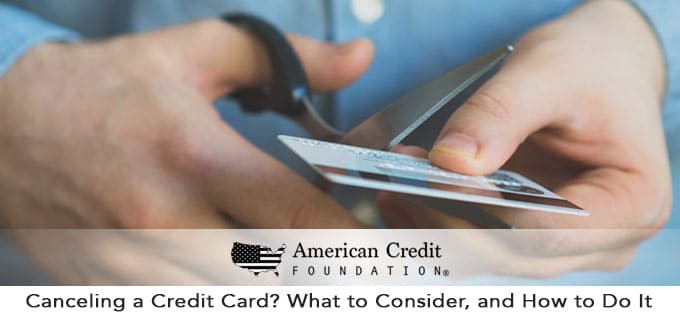
You’re fed up with XYZ bank, for whatever reason, so you’re planning to close your account and get rid of that credit card. Maybe you just don’t use ABC credit card anymore, now that you have a different card with better incentives. Or maybe you’ve succeeded in paying down your balance and think shedding that card might prevent another round of excessive spending.
While cleaning up your wallet might sound like a solid financial investment, don’t close a credit card without some careful assessment.
If your motivation for getting rid of a card is dealing with a pile of debt, please remember that canceling a credit card DOES NOT make your debt go away. But if you’ve reached that goal of a zero balance, you might wonder whether getting rid of this particular card is a good idea.
Things to Consider Before You Cancel
Keep in mind that canceling a card will affect your credit score.
If you’re in the process of applying for a mortgage or financing a new car, you might want to delay canceling any credit cards to avoid jeopardizing your acceptance. The good news: For most consumers, this impact is usually temporary and insignificant in the grand scheme of things.
If your card has a high credit limit, your credit score could take a hit if you close that account – especially if you are carrying high balances on your other cards.
To prevent this, pay off the balances on all of your other cards before canceling a credit card. If you have zero balances, you also have a zero “credit utilization rate,” which is your ratio of available credit to the amount of credit you’re actually using. Zero utilization means that you have your entire line of credit available. But if you carry a high balance compared to your credit limit, you have very little still available.
Once you’ve reached a zero balance, make sure you confirm this with a phone call to your credit card company. Speak to a real person! Don’t make the assumption that the balance is zero; interest or other charges may have accumulated on your account since you made your last payment.
Many of us chose a credit card for the specific rewards program it offered when we applied. If you plan to cancel a rewards-based card, be sure to redeem all your points! Read ALL the fine print to figure out when best to cancel your card. Sometimes you might need to accrue a certain number of points or reach a certain price point before you can redeem points, or maybe you’re only allowed to cash in monthly or on certain days of the month. Whatever the restrictions, knowing them in advance can help you plan how to retain as much of your earned rewards as possible.
With all this said, we’d like to mention one caveat: Don’t close out your oldest credit card. Like your childhood blankie, your old credit card provides comfort and security. In fact, the credit bureaus see you as more reliable if you’ve had the same creditor for a long time, and they score your risk accordingly.
How to Cancel
So, you’ve assessed your credit card situation carefully. And you’ve determined that it’s time to purge. The process of canceling a credit card isn’t very complicated.
1. Get to zero
Remember, you can’t cancel a credit account that has any balance. (Well, in some cases, your lender might allow this with a very steep penalty like boosting the interest rate on your remaining balance or demanding payment in full.) If you really want to close an account with a balance, a balance transfer to a card with better terms is also an option. Look for offers from one of your other existing accounts. Many banks try to drum up business by pulling your funds away from their competitors, so shop around for lower-rate (or even zero-interest) balance transfer offers. Even if your financial institution doesn’t advertise any such deals, it’s not unheard of to get a special low rate just by making a few phone calls.
If you typically don’t pay each statement in full, you will likely need to pay the full balance for two consecutive months to erase the balance and stop all interest charges.
2. Call your rep
Once you’re ready, you’ll need to contact your credit card company. Some companies will accept your cancellation without making you speak with a representative, but typically they require you to talk to someone. Remember that their goal is customer retention, so the rep might try to persuade you to keep your account. But it’s your account – and your right to cancel – so don’t give in to the pressure.

Be sure the representative provides you with some sort of tracking number of the cancellation transaction. Write this down, along with the date, time, and operator’s name. Before concluding the call, request written confirmation of the account’s closure.
3. Verify cancellation
Depending on the lender, it could be more than a month before you receive this confirmation. (If you have online access to your account, you might notice your account marked as closed prior to that.) Then visit the credit bureaus to see your credit report.
If the account still appears to be open, you might need to call your card’s customer service and repeat the cancellation process. In the unlikely event that a second attempt fails, you can file a dispute through one of the three credit bureaus (you’ll only need to do this once, as each is required to notify the others of your dispute).
4. Destroy the evidence
When you’ve received confirmation (and then double-checked closure on your credit report), destroy the card itself. We can’t stress enough: Do not toss it in the trash! Cut it up into many little pieces, and make your cuts across several directions to make it impossible to reassemble it. Better yet, cut it up, then distribute the pieces into multiple trash bins.
Deciding to cancel a credit card isn’t necessarily tricky but definitely warrants more than a passing thought. If you still aren’t sure or need a more in-depth analysis on your financial situation, our team at American Credit Foundation is ready to help you uncover solutions that work for you.